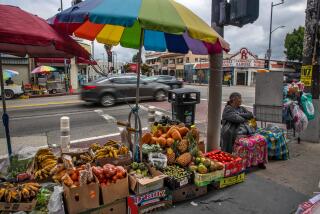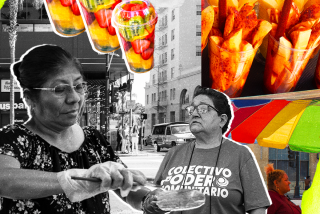Government regulation: Lemonade Day done wrong
- Share via
My 8-year-old recently got the lemonade stand itch. So we started laying plans to enrich her college fund by enticing passers-by with white chocolate-pistachio cookies and juice from organic lemons. Fortunately, our property backs onto one of the busiest paved urban trails in America, bustling on weekends with cyclists, rollerbladers and pedestrians. Visions of dollars danced in our heads.
Googling for the perfect lemonade recipe, we soon found a site promoting a May 1 “national” event called Lemonade Day. This event, organizers say, is an “initiative designed to teach kids how to start, own and operate their own business — a lemonade stand.” What better day to begin building our lemonade empire?
After shopping for her raw materials, I gave my kid a bedtime primer about starting a business. How much profit do you make after expenses? How should you promote your business? Give the customer a great product. She soaked it up and went to sleep all inspiration and smiles. Then I got to thinking about something I hadn’t discussed with her: government regulations.
The next morning I began a three-day phone trek through the maze of government agencies that regulate businesses and food sales, and I watched my child’s All-American plan crumble like fresh-baked cookies.
My first call was to the parks department, which maintains the trail. That agency is a sponsor of the local Lemonade Day, but, alas, does not permit lemonade stands on its properties any other day of the year. It especially doesn’t allow them alongside the trail. Why? They would be “dangerous”; accidents would happen. Do they expect any accidents on Lemonade Day, I asked? “No, we are confident nothing bad will happen that day.” Poof! Our best option for a profitable lemonade stand was gone.
My next calls were to the health department, where I eventually found an official who cheerfully told me that, except on Lemonade Day, no child can legally operate a lemonade stand in our city. Nowhere. No time. As far as she is concerned, Lemonade Day itself is just food poisoning waiting to happen.
A practical woman as well as a killjoy, she said that near her home, she wouldn’t prevent a kid from operating a stand: “The neighbors would hate me.” But if her department got a complaint about a kid in another neighborhood, the enforcement team would be dispatched. The kid would be instructed to shut down his stand. If he refused to obey, the police would be called to cite the child for violating the health code, which applies to children no less than to adults.
Most likely, no official would brave public ridicule for lowering the boom on a kid with a lemonade stand. But a parent might be a less controversial target for enforcement penalties, which could include fines and even jail time.
Don’t scoff. From time to time, zealous officials do force kids to shut down their lemonade stands. Even Girl Scouts have gotten into trouble for selling cookies in front of homes and businesses.
What the Lemonade Day organizers should teach the children, said the health official, is about the importance of learning and obeying the government regulations that prohibit lemonade stands.
If we had made it past the health and parks departments, my kid would have been stymied by zoning laws that prohibit lemonade stands in residential neighborhoods. Overcoming that barrier, we would have hung our heads at the daunting costs of business and vending licenses, not to mention taxes.
Lemonade Day is promoted as a way to “inspire a budding entrepreneur!” But it is actually a dispiriting lesson about how hard it now is to become an entrepreneur, whether you’re an adult or a child. It is about how even the most harmless enterprise, the humble lemonade stand, has been sacrificed on the altar of government regulation.
Learning to be an entrepreneur “starts with a lemonade stand,” say the organizers of Lemonade Day. But they don’t want to talk about the regulations that make it impossible for my kid to become a lemonade stand entrepreneur. They tell me it is “silly” and “beside the point” to focus on the regulations. I am told that Lemonade Day is about kids learning to “give back to their communities,” “do better in school” and “open bank accounts.” It is not about something so self-serving as making a profit by selling a good product. That is the old American way, but the new way is living with rules that banish the lemonade stand to one government-approved day a year.
What are my kid and I going to do on Lemonade Day? We are going to set up a stand in one of the permitted locations — in a park or at one of the approved sponsors — with hundreds of other kids doing the same thing. But our “secret ingredient” is that we will hand out leaflets explaining why operating a lemonade stand makes my kid and yours not just a hopeful entrepreneur, but an actual lawbreaker.
Next year they should rename it Regulation Day.
Nicolas S. Martin is executive director of the Consumer Health Education Council in Indianapolis.
More to Read
A cure for the common opinion
Get thought-provoking perspectives with our weekly newsletter.
You may occasionally receive promotional content from the Los Angeles Times.










